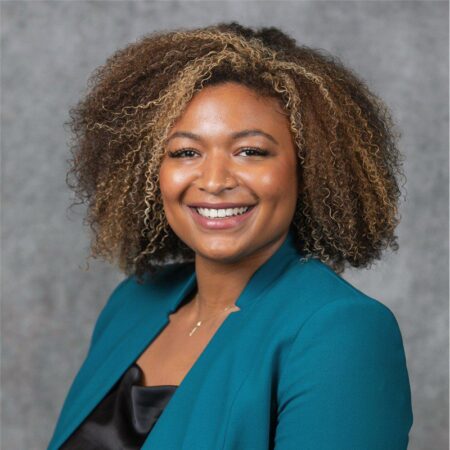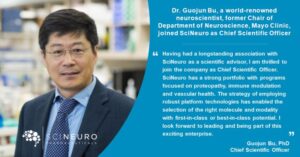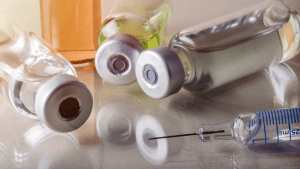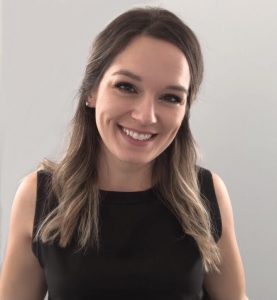
5 Questions With Marné Garretson, Scientist at Cardinal Health
“5 Questions With…” is a recurring BioBuzz series where we reach out to interesting people to share a little about themselves, their work, and maybe something completely unrelated. This week we welcome Marné Garretson, Scientist at Cardinal Health, a distributor of pharmaceuticals, a global manufacturer and distributor of medical and laboratory products, and a provider of performance and data solutions for health care facilities.
As a Scientist within Cardinal Health’s Real-World Evidence & Insights specialty business, Marné Garretson provides subject matter expertise supporting a portfolio of health outcomes research studies examining clinical outcomes and demonstrating value for specialty therapies. Prior to joining Cardinal Health, Marné has had a variety of professional experiences in the applications of epidemiological research methods, biostatistics, and project management, in addition to research experiences that have provided her with opportunities to serve as a thought leader.
1) Please introduce yourself to our audience by looking back at your education, training, and career.
My passion for the scientific method and research process has been fueled by my personal desire to seek to understand the “why” behind the “what.” My Grandmother fondly recounts that as a young child, I would incessantly ask “why” questions to better understand my surroundings, even for the most mundane activities. My career interests in the sciences were ignited through my participation in the Distance Learning Center’s STEMM (Science, Technology, Engineering, Math and Medicine) PREP Project, a longitudinal training continuum and multi-institutional mentorship program designed to produce multiple generations of minority researchers in STEMM. I was selected to participate in this program in 7th grade and was provided with opportunities to take graduate level STEMM courses with rotating summer internships in collaborating institutions’ basic science, engineering, and technology labs. Through this program, I cultivated lifelong friendships and was supported in building the foundation for my career as a Scientist. While I enjoyed my experiences working in bench science, I was exposed to the intersectionality of public health through my undergraduate studies and decided to pursue Epidemiology as a field of specialty while in graduate school.
Through my graduate studies at Columbia University Mailman School of Public Health, I was equipped with sound methodological training in epidemiology, operations analysis, and outcomes research. During my masters-level training, I was provided with an opportunity to intern at the Centre for the AIDS Programme of Research in South Africa (CAPRISA) on a project designed to combat the continuing threat of the multidrug-resistant and extensively drug-resistant tuberculosis (M[X]DR-TB) and HIV co-infection epidemic in KwaZulu-Natal, South Africa. Working alongside, South African epidemiologists, clinicians, and scientists we sought to bridge an evidence gap and complement previous research by describing trends in gender, HIV status, refusal of HIV testing, and M(X)DR-TB prevalence for all patients with M(X)DR-TB presenting to care at King DinuZulu Hospital (KDZ) over a 12-year study period. This research experience was transformative for me, personally and professionally, and ignited my interest to explore health economics and outcomes research (HEOR) as a discipline.
My interest in pharmaceutical health services research arose from witnessing communities being affected by the downstream impacts from their lack of representation in clinical trial research. In my role at the NYC Department of Health & Mental Hygiene (NYC DOHMH), I served as a Principal Investigator responsible for the design, management, and implementation of a portfolio of health outcomes studies to monitor health behavior trends and associations with social and structural factors related to sexual health care and HIV prevention and transmission. While working in this capacity, Descovy for PrEP was approved by the FDA to prevent HIV for people at risk through sex; however, it was not recommended for cisgender women as they were excluded from the clinical trials. The decision to exclude this demographic limited the approved indication to men only thereby reinforcing evidence gaps and disparities in access to this health promotion tool, as Descovy’s safety and effectiveness in women is unknown.
While this approval was an advancement for HIV prevention for some, this novel biomedical intervention remained inaccessible to many that face a disproportionate burden of HIV diagnoses in the United States. Engaging with Black and Latina women in my capacity at the NYC DOHMH and understanding trends in PrEP awareness and use among these communities in NYC, I felt the sense of disregard that is perceived by many as access to health promotion and prevention tools are prioritized for some communities while other communities are denied this same access. This was disheartening. Given my experience in conducting observational research, I was very keen on finding opportunities to leverage my interests and professional training while closing gaps in health disparities through working to advance representation of medically underserved communities in clinical research. This experience was the catalyst for my career transition to the discipline of pharmaceutical Real-World Evidence.
In my current role as a Scientist, I support the design and implementation of innovative Real-World Data (RWD) and Real-World Evidence (RWE) strategies and activities to produce scientific evidence to demonstrate clinical effectiveness, publications to inform product strategy decisions for our pharmaceutical clients and demonstrate value for payers, providers, and patients.
2) You have an extensive background in the Life Sciences spanning almost 13 years. What is one skill or lesson you learned early on that you still utilize today?
At various points throughout my professional career, I can recall internalizing many of my failed experiments while not realizing that this was a necessary part of the research process. In recounting these experiences, the biggest lesson I’ve learned has centered on building tolerance for failure. I have learned that the value of failure is to actively engage with our limits of understanding and probe for our blind spots. In uncovering those blind spots, you are then gifted with an opportunity to change your course of action or continue with the status quo. In learning this lesson, I had to change my perspective and use failure as a heuristic tool to embrace the experimental nature of life and conceive of viable alternatives to achieve any desired outcome. In reframing my perspective, I have cultivated resilience, enforced my sense of self-trust and embraced my failures as a “necessary evil” for growth. One phrase that I continue to tell myself to reinforce this perspective shift is, “everything in life is an experiment and every failure is a learning opportunity.”
3) You have been with Cardinal Health for about 10 months. What were some of the significant factors that made you want to be a part of the team initially?
One of the most significant factors that made me want to be a part of the team initially was the transparent and engaging interview process. During the interview process, I enjoyed the open and direct conversations where I was able to share my professional experiences that shaped my transferrable skillset, discuss my 5-year career goals, and describe what I can offer to this role and team. Additionally, my interview panel was transparent and provided me with great detail in describing the function and expectations of this role and how I would be interfacing with cross-functional teams and our clients. My interview process exemplified Cardinal Health’s core values of accountability and integrity.
Upon joining the RWE team, I immediately observed Cardinal Health’s mission-driven values in action. Across all functions in Insights & Engagements, we are genuinely committed to making a difference for our customers and communities as we strive to develop innovative products and services that make healthcare safer and more productive.
As I have grown in my role as a Scientist, my colleagues have demonstrated that they not only value my work products but also my contributions as a person on an individual level. In this capacity, I have taken on “stretch assignments” that have challenged my methodological skillset while also having leadership support to leverage my diverse professional experiences to deliver results for our customers.
4) Working at Cardinal Health as a Scientist, you are very hands on with the research of a product and analytical study of the results achieved. What clinical research project meant the most to you over the time you have spent with your team?
I have had the fortunate experience to support a study designed to characterize patient-centric outcomes among patients with Follicular Lymphoma (FL). This was a patient-reported outcomes (PRO) study that leveraged evidence-based questionnaires to assess patient satisfaction with treatment, quality of life, and work productivity across various subgroups of interest. I enjoyed the opportunity to apply my skillset and previous experiences working with patient-reported outcomes to examine social and structural factors that impact treatment options and survival outcomes for patients living with FL in the real-world setting. As part of this study, we were able to translate our research findings into peer-reviewed abstracts and manuscripts to assist communication efforts of value proposition for patients, providers, and pharmaceutical manufacturers.
I personally love the richness in data and insights that PRO studies can generate to elucidate the impact of a medical condition and provide evidence of efficacy and tolerability of a particular treatment from a patient perspective. The value of PRO data generated in the real-world setting can provide insights directly from the patient to understand what happens outside of the clinical setting with implications for post-market surveillance, compliance with regulatory requirements and considerations for expanding an indication profile for a product.
5) You’re stranded on a deserted island and have to survive until rescue arrives. What 3 people would you choose to help aid you in survival?
If I was stranded on a deserted island, my dream team to help aid in my survival would be Jason Statham, Barack Obama, and Alexis Nikole Nelson. I chose these individuals after careful deliberation for the following reasons: Jason’s invaluable MMA training and survival skills may come in handy if we have to fight for our lives; our former President’s negotiation and problem-solving skills will help us get out of any prickly conversations; and Alexis’s foraging know-how to show us how to live off the land to sustain our nutritional needs until rescue arrives!
Would you or your colleague like to be featured for our next “5 Questions With…”? Reach out at [email protected]
- About the Author
- Latest Posts
BioBuzz is a community led, experience focused, biotech and life sciences media and events company. BioBuzz highlights regional breaking news, industry professionals, jobs, events, and resources for business and career growth. Their weekly newsletter is subscribed to by thousands in the BioHealth Capital Region and Greater Philadelphia as the go-to for industry updates.





